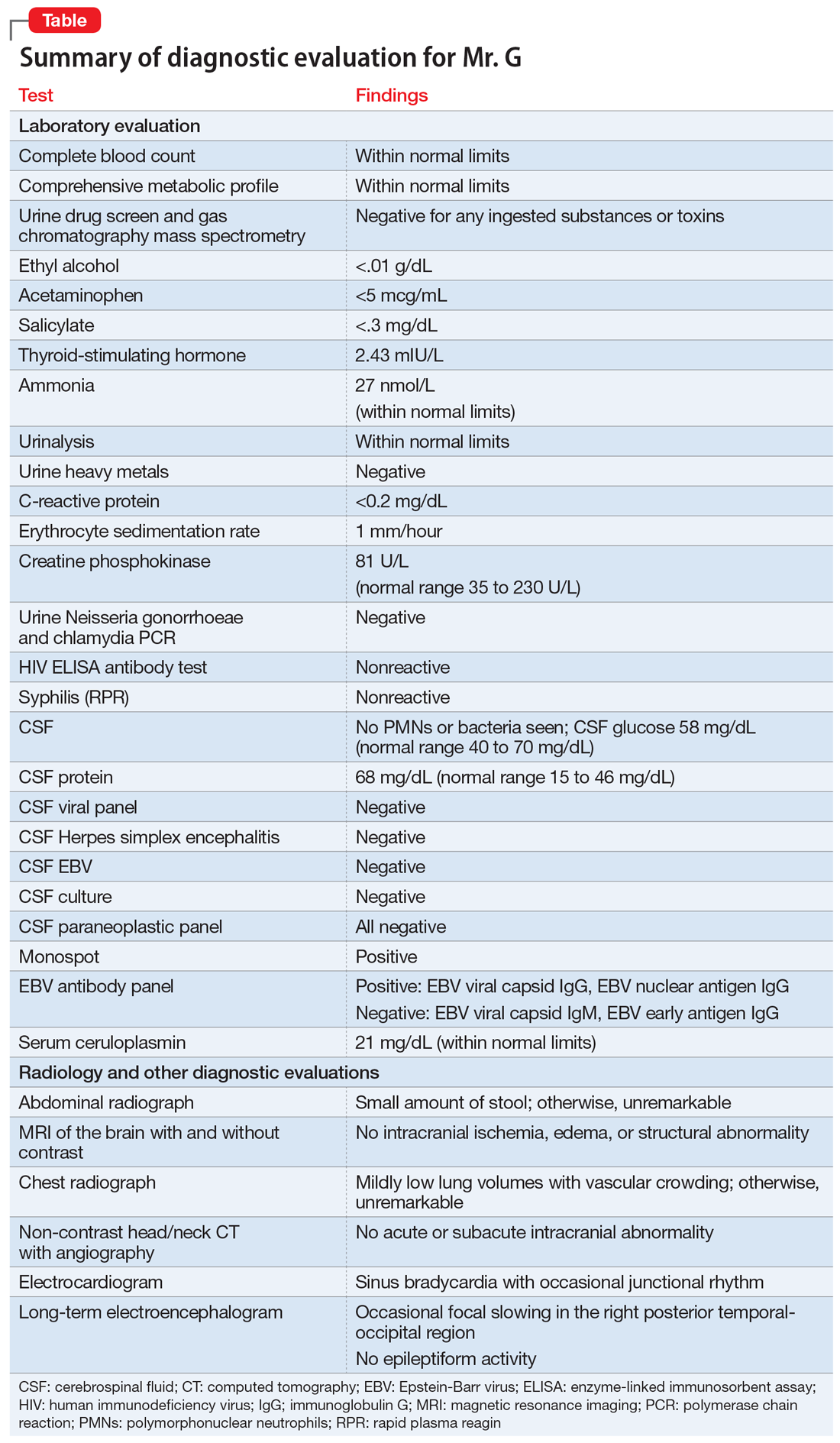Mr. G undergoes a Monospot test, which is positive, with subsequent evidence of a prior, but not active, Epstein-Barr virus (EBV) infection. He also has a mildly elevated CSF protein level, but subsequent CSF labs are negative for both infectious and non-infectious processes. An EEG reveals focal neuronal slowing.
During brief periods of wakefulness, Mr. G calls out to his mother and says, “I’m not going to make it to my birthday,” and “You’re going to have to let me go.” He occasionally becomes combative, pulling at IV lines and swearing at staff. His bradycardia resolves without intervention during his admission. On Day 8 of his hospitalization, Mr. G displays hypersexuality and makes sexually suggestive comments toward female staff members. He also experiences recurrence of hyperphagia.
On Day 10 of his stay on the pediatric unit, because of the emergence of hypersexuality and hyperphagia, along with a largely negative medical evaluation, Mr. G is transferred to the pediatric psychiatric unit for ongoing evaluation and management.
The authors’ observations
Given Mr. G’s rapid onset of confusion, hypersomnia, and emotional dysregulation, our differential diagnosis included delirium of unclear etiology, substance intoxication, autoimmune encephalitis, viral meningitis, heavy metal intoxication, primary psychotic disorder, and KLS. Mr. G underwent an extensive diagnostic evaluation, which was largely unremarkable (Table). He had a mildly elevated CSF protein level, but subsequent CSF labs were negative for both infectious and non-infectious processes. When Mr. G was transferred to the pediatric inpatient psychiatric unit on Day 10, the presumptive diagnosis was KLS.
KLS is a rare neurologic disorder, with an incidence of 1 to 5 in 1 million and a 4:1 male-to-female predominance.1 It poses a diagnostic challenge due to its low prevalence and broad differential. The disorder typically presents in early adolescence and is characterized by episodes of severe hypersomnia with associated cognitive and/or behavioral disturbance2 (Box2-4). Bradycardia, as seen in Mr. G, and other forms of autonomic dysregulation have been reported in the literature, as has the focal neuronal slowing noted on Mr. G’s EEG.3
KLS has a median age of onset of 15 years (mean 15.7 ± 6.0 years),2 with cyclical episodes lasting between 2.5 and 80 days (median: 10 days; mean: 12 ± 9 days).3 Most often, symptoms spontaneously remit by the third or fourth decade of life.2 Hypersomnia is a major hallmark of these cyclical episodes; on average, patients sleep 17.9 ± 3.6 hours/day.3 Furthermore, patients typically develop cognitive symptoms such as difficulty speaking and reading.3 Derealization, with out-of-body experiences (63%), hyperphagia (66%), and hypersexuality (53%), are also found in patients with KLS.2 The syndrome has a high prevalence in the Ashkenazi Jewish population, which suggests a genetic predisposition.5 KLS exacerbations are often associated with recent infection or fever, alcohol use, sleep deprivation, unusual stress, physical exertion, traveling, head trauma, or marijuana use.3 Less commonly, KLS has been associated with a complicated birth history or developmental delay.2Continue to: TREATMENT Methylphenidate and a safety plan



